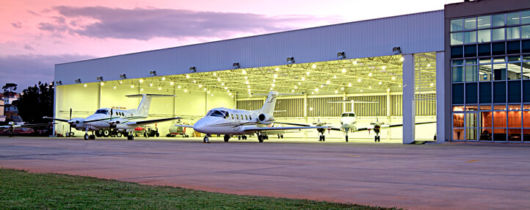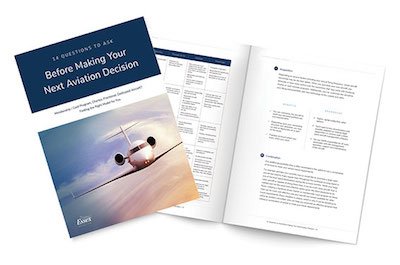
When purchasing an aircraft, you want to be sure you’re getting a fair or current market price. You’d also like to be confident that the seller is being candid about their valuation; you don’t want to find out after the fact that you could have paid far less than the aircraft was worth.
Private aircraft have long been seen as a luxury item commonly associated with high-net-worth individuals. But in recent years, corporate aircraft have become a valuable tool for organizations of all sizes and in all industries. In today’s fast-paced economy, time is a precious commodity, and business aviation offers companies the convenience and flexibility they need to optimize efficiency and operate on a truly global scale.
In this article, we’ll explore the benefits of business aviation and discuss key considerations for any organization interested in it.
What Is Business Aviation?
The term “business aviation” broadly refers to the use of private or business aircraft — including turboprops and helicopters — for business purposes, such as senior employee or leadership travel or cargo transportation. Also known as corporate aviation, business aviation is a popular method of travel for entrepreneurs, executives and organizations because it offers an unparalleled degree of flexibility and convenience, enabling companies to complete more trips in less time, to enhance security, and to be more productive while in transit.
Why Should Businesses Consider Corporate Aviation?
According to the National Business Aviation Association (NBAA), “Companies that utilize business aircraft outperform non-aviation users in several important financial measures, including annual earnings growth, stock and dividend growth, total share price and market capitalization.”
And that’s only the beginning of the ways businesses benefit from corporate aviation. Business aviation also offers:
- Access to a wider range of airports, including some areas not accessible via commercial airline services. The NBAA also states that business aviation has access to 10 times the number of U.S. airports — that’s over 5,000 public use facilities — versus those serviced by commercial airlines. This expanded access enables travelers to arrive closer to their final destination, saving valuable time.
- Flexible and predictable scheduling, with significantly reduced risk of flight delays or cancellations. Corporate aviation not only provides travelers with a wider range of destinations from which to choose but also enables them to fly according to their own schedules. And without being subject to commercial airline schedules, businesses can ensure that they’re consistently on time for meetings with customers, suppliers and other stakeholders.
- Access to in-flight connectivity, thereby enabling travelers to work during their flights, remain in constant contact with colleagues on the ground, monitor emerging situations and respond as needed.
- Privacy and security. With business aviation, travelers needn’t worry about prying eyes or fellow passengers eavesdropping. Without the risk of unwanted attention, travelers can work and even host business meetings in the air, enhancing productivity.
- The ability to move whole teams in a single flight. Should a company need to send its entire executive team — or any other team within their organization — to a meeting, conference or other event, corporate aviation makes it incredibly easy to do so. It also gives teams the opportunity to work while in transit, meaning no time is lost to travel.
- The ability to travel to multiple destinations in a day. Executives’ time is in high demand, and they’re often called upon to oversee multiple projects or meet with multiple clients or stakeholders on any given day. Business aviation is ideal for such full schedules, dramatically reducing transit time and enabling executives to visit multiple locations in a single day.
- The ability to move equipment with ease. Certain organizations may need to transport sensitive or valuable equipment, sometimes within very specific time frames. Though ground transportation is certainly an option, it’s less than ideal for time-sensitive shipments and can be a major investment. Chartering private aircraft is another option but can be costly, especially if an organization has a high utilization rate.
Business aviation gives companies access to dedicated aircraft that they can use to transport equipment as needed, with all of the privacy, security and flexibility inherent to private aviation.
Key Considerations When Evaluating Business Aviation
For organizations interested in pursuing corporate aviation, there are a few things to consider to make an informed decision.
These include:
- Utilization: How often will your team need to use the aircraft? This information can help company leadership determine whether it makes more sense to acquire an aircraft or to pursue an alternative corporate aviation arrangement, such as chartering or enrolling in a jet card membership program. Generally speaking, the higher your company’s anticipated utilization, the more it makes sense to acquire an aircraft. A qualified private aviation consultant can conduct a full transportation analysis to assess your organization’s needs.
- In-flight Requirements: Will passengers on your company aircraft require high-speed connectivity? On-board meeting space? Or perhaps sleeping accommodations for long-range flights? Establishing common use cases for a company aircraft will help you define requirements, which will provide a solid foundation when reviewing candidate aircraft makes and models and determining which one is most suitable for your needs.
- Destinations: Will your team primarily fly domestic, international or a combination of the two? Certain aircraft models are better suited to shorter, domestic flights, while others are designed for long-range and even ultra-long-range flights. Having a clear idea of how long your trips will typically be and which airports you intend to fly into and out of — both publicly owned and private — will help you make an informed decision.
- Operations: Will your company create its own in-house flight department, or retain the services of an aircraft management company? Many organizations have the resources to establish their own corporate flight department and enjoy the level of control it grants them over business aviation operations.
Others prefer to entrust aircraft operations to a management company, drawing upon its existing expertise and resources. Again, a qualified aviation consultant can be a real asset when evaluating different options and determining which one makes the most sense for your company.
Identifying the right business aviation arrangement for your organization starts with asking the right questions. Essex Aviation’s in-depth eBook, “Questions You Should be Asking Before Making Your Next Aviation Decision,” will help you understand the options available so you can make a sound investment.







